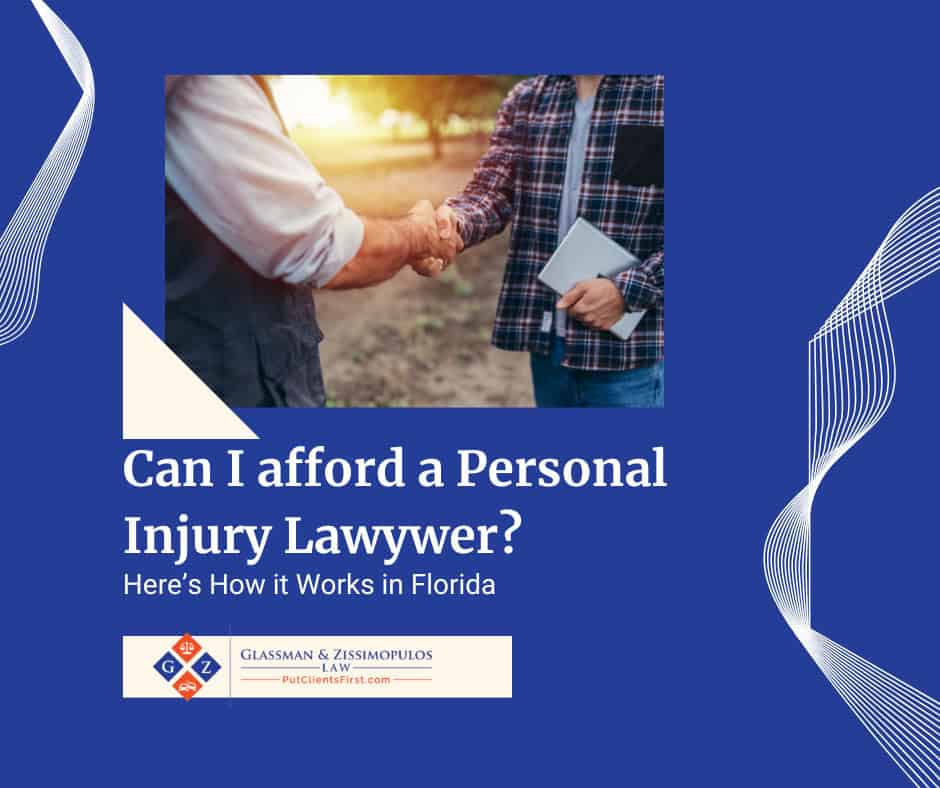You’ve been in an accident. The medical bills are piling up, you’re missing work, and now someone tells you that you might need a lawyer. Your first thought might be: “There’s no way I can afford that.”
Here’s the good news: In most personal injury cases in Florida, you don’t pay anything up front to hire an attorney. That’s because most personal injury lawyers work on what’s called a contingency fee basis.
Let’s break down exactly what that means, how the process works, and why it’s designed to make legal help accessible no matter your bank account.
What Is a Contingency Fee?
A contingency fee means your lawyer’s payment is contingent on you getting a settlement or a win at trial. In other words:
- If you win or settle your case – Your lawyer is paid a percentage of your settlement or verdict.
- If, at the end, you don’t win or settle, then you don’t owe your lawyer anything.
It’s the legal world’s version of “no win, no fee.”
How Much Is the Percentage in Florida?
Florida has rules about how contingency fees work, outlined in the Florida Bar’s guidelines. While the exact percentage can vary depending on your case and the stage it reaches, here is a common structure for the attorney’s fee:
- Pre-lawsuit settlement: 33⅓% or one-third of the recovery.
- If a lawsuit is filed and the defendant denies responsibility, the fee increases to 40%, because litigation involves more time and work, often adding six to eighteen months of additional time to a case.
For example:
If your case settles before trial for $90,000, a one-third contingency fee would mean $30,000 goes to your lawyer, plus any case costs. The rest of the money goes to you to help pay for past medical bills, future medical bills, and damages such as pain and suffering.
What About Case Costs?
Contingency fees cover attorney’s fees, but there are also case costs, expenses your lawyer pays up front to move your case forward. These can include:
- Court filing fees
- Expert witness fees
- Medical record retrieval costs
- Deposition expenses
Most personal injury law firms in Florida front these costs for you. Then, if you win or settle, the costs are deducted from your portion of the recovery. If you don’t win, most firms won’t ask you to reimburse these costs, but that’s something you should clarify with your attorney before signing an agreement.
Why Contingency Fees Benefit Clients
The contingency fee system exists for a reason: It levels the playing field.
- No upfront payment – You don’t have to drain your savings to get legal help.
- Shared risk – Your lawyer only gets paid if you do, so they have every reason to work hard on your case.
- Access to resources – You get the benefit of a law firm’s experience, investigators, and experts without paying out of pocket.
This structure is especially important in personal injury cases, where you might already be facing financial stress due to medical bills and lost income.
How the Process Works in a Florida Personal Injury Case
Here’s what typically happens when you hire a personal injury lawyer on a contingency basis in Florida:
1. Free Consultation
Most personal injury lawyers offer a free initial meeting, either in person, by phone, or via video call. This is your chance to tell your story, ask questions, and learn about your rights.
2. Signing a Contingency Fee Agreement
If you decide to move forward, you’ll sign a written agreement explaining the percentage your lawyer will take if you win and how costs will be handled. This is required by the Florida Bar. In Florida, your lawyer should also provide you with a document called a Client’s Statement of Rights, which explains the rights you have when signing a contingency contract in Florida.
3. Investigation & Evidence Gathering
Your lawyer will collect medical records, accident reports, witness statements, and other evidence. They may also consult with experts to strengthen your claim.
4. Negotiations
Often, your lawyer will first negotiate with the insurance company to try to reach a fair settlement without filing a lawsuit.
5. Filing a Lawsuit (If Needed)
If the insurance company refuses to offer a reasonable settlement, your lawyer can file a lawsuit and prepare for trial.
6. Resolution
Your case may end in a settlement or go to trial. If you win, your lawyer takes their agreed percentage and reimburses any advanced costs. You get the rest.
Questions to Ask Before You Sign
Even though contingency fees are common, not all agreements are the same. Before hiring a lawyer, ask:
- What percentage will you take if my case settles?
- What percentage if it goes to trial?
- Who pays case costs if we lose?
- Will I receive an itemized breakdown at the end?
A reputable lawyer will be transparent and put all terms in writing.
Final Thoughts
If you’ve been injured in Florida, you can afford a personal injury lawyer because you typically don’t pay unless you win. The contingency fee system is designed to give everyone access to legal help, not just those who can afford an hourly rate.
By hiring a lawyer on contingency, you’re essentially saying, “Let’s win this together.” And if you choose the right lawyer, that’s exactly what they’ll be aiming for.
Don’t let fear about cost stop you from getting legal advice. The consultation is free, the payment is only if you win, and having a skilled attorney can often mean the difference between a lowball offer and the full compensation you deserve.
Call Glassman and Zissimopulos and our team of dedicated attorneys today. (352) 505-4515 or Toll-Free at (844) 787-2543. When you call, you will be able to speak with a lawyer. This is our commitment to you.


